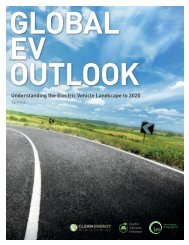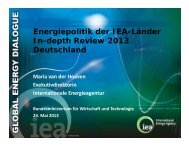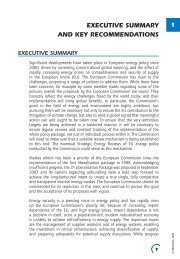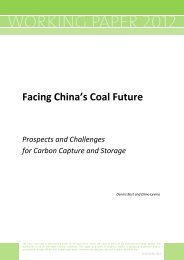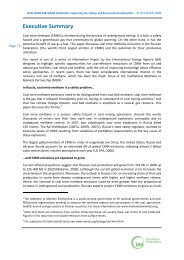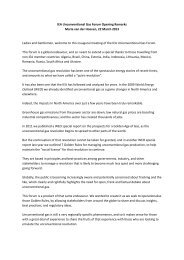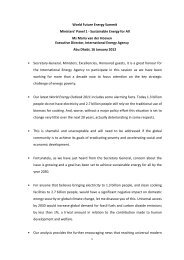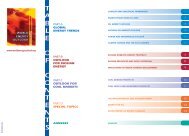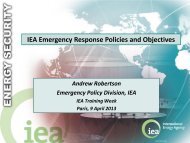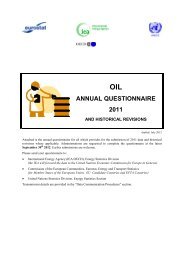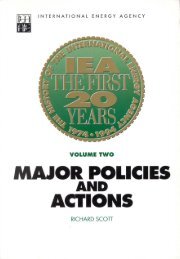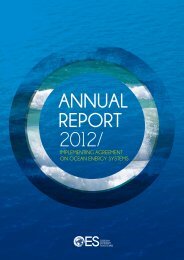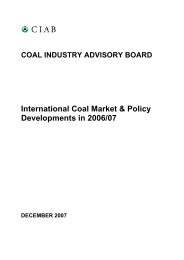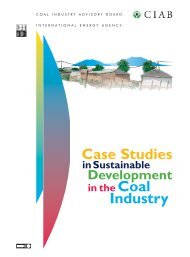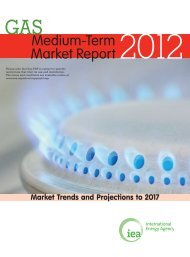Coal and Sustainable Development - IEA
Coal and Sustainable Development - IEA
Coal and Sustainable Development - IEA
Create successful ePaper yourself
Turn your PDF publications into a flip-book with our unique Google optimized e-Paper software.
November 2003<br />
COAL INDUSTRY ADVISORY BOARD<br />
Meeting with <strong>IEA</strong> Governing Board, Wednesday 10 December 2003<br />
Background Paper<br />
<strong>Coal</strong> <strong>and</strong> <strong>Sustainable</strong> <strong>Development</strong><br />
x<br />
x<br />
x<br />
x<br />
x<br />
<strong>Coal</strong> will play an important role in energy systems that support sustainable<br />
development for the foreseeable future. This is because of coal’s unique<br />
combination of advantages: it is affordable, it is safe to transport <strong>and</strong> store <strong>and</strong><br />
it is available from a wide range of sources. <strong>Coal</strong> therefore remains essential<br />
in achieving a diverse, balanced <strong>and</strong> secure energy mix. It can also meet the<br />
growing energy needs of many developing countries.<br />
While improved coal technologies have provided very substantial efficiency<br />
<strong>and</strong> emission improvements to date, accelerated technological effort is<br />
required to reduce greenhouse gas emissions <strong>and</strong> to improve coal’s<br />
environmental performance. Deployment of cleaner <strong>and</strong> higher efficiency<br />
technologies will be important in both developed <strong>and</strong> developing countries.<br />
Further technical solutions include improved combustion efficiency <strong>and</strong><br />
reduced emissions, coal gasification, new approaches to carbon capture <strong>and</strong><br />
storage, <strong>and</strong> the production of hydrogen from coal, which will play an<br />
important part in a hydrogen-based energy future.<br />
Any response to climate change considerations must provide the basis for<br />
sustainable development, by addressing ongoing economic <strong>and</strong> social<br />
requirements as well as the environmental challenge.<br />
The improvement in coal’s performance in terms of sustainable development<br />
will require co-operation between governments, individual corporations <strong>and</strong><br />
across industries to accelerate improvement. Collaboration has begun but<br />
much more sustained effort is needed.<br />
<strong>Sustainable</strong> development has been an important part of public policy debate for the<br />
last decade. It has evolved into a widely subscribed ideal for how business <strong>and</strong><br />
society should interact <strong>and</strong> function. A widely accepted definition of sustainable<br />
development is: Meeting the needs of the present without compromising the ability of future<br />
generations to meet their own needs.<br />
The multiple objectives (“three pillars”) of sustainable development – economic<br />
prosperity, environmental sustainability <strong>and</strong> social well being, make it a concept easy<br />
to embrace but challenging to implement in a practical manner. While practical<br />
implementation is difficult, it is important to accomplish, given the broad societal <strong>and</strong><br />
governmental pressure for industry to continue to be responsive.<br />
Energy has a major role to contribute, for society to meet the current <strong>and</strong> future needs<br />
of people. The supply of affordable <strong>and</strong> reliable energy is essential for economic<br />
development <strong>and</strong> is a significant contributor to the alleviation of poverty, improved<br />
health, <strong>and</strong> better quality of life. The current energy mix, typically based on lowest<br />
economic costs, faces many challenges. However it is widely accepted that the short-
November 2003<br />
term substitution of existing fuels with’ clean’ or ‘renewable’ energy sources will not<br />
yet meet societal needs for abundant, affordable <strong>and</strong> reliable energy. <strong>Coal</strong> has a<br />
crucial role in meeting current needs <strong>and</strong> is a resource bridge to meet future goals<br />
through the enhancement of knowledge <strong>and</strong> technology.<br />
Technological advances have tamed coal’s traditional disadvantages: local <strong>and</strong><br />
regional environmental impacts. The use of state of the art technology can make a<br />
contribution to coal meeting stringent environmental st<strong>and</strong>ards. However, state of the<br />
art technologies are not universally deployed <strong>and</strong> this remains a high priority for<br />
governments, coal users <strong>and</strong> suppliers. Improvement in environmental performance is<br />
technologically feasible <strong>and</strong> should be a priority of industry <strong>and</strong> government to<br />
enhance coal’s contribution to environmental sustainability.<br />
Policies should be put in place to encourage deployment of cleaner coal technologies.<br />
These would encourage general improvement in industry sectors, essential to<br />
underpin changes in individual companies. Already, many major corporations are<br />
changing the way they operate because of perceived benefits in sustainable<br />
development. In the coal industry, collaboration between coal producers <strong>and</strong> users<br />
could improve coal’s contribution to sustainable development through product<br />
stewardship.<br />
The CIAB recognises the paramount importance of sustainable development, but<br />
stresses that policies that place an undue emphasis on any one pillar will be<br />
ineffective.<br />
The Developing Country Perspective<br />
One third of the world’s population of six billion lives in developing countries. Many<br />
of these people lack access to modern energy services for economic <strong>and</strong> social<br />
development <strong>and</strong> some of their present energy system is unsustainable. In World<br />
Energy Outlook 2002 the <strong>IEA</strong> estimates that at present about 1.6 billion people are<br />
without access to electricity.<br />
In the developing world, human dignity dem<strong>and</strong>s that poverty alleviation take<br />
precedence – providing food, shelter, infrastructure <strong>and</strong> basic human services to the<br />
citizens of the world that live below the subsistence level. In this context, economic<br />
growth provides financial resources to exp<strong>and</strong> social services <strong>and</strong> developing country<br />
governments need to also focus on these issues. An essential component of economic<br />
growth is energy use. We can expect that as the developing world works to alleviate<br />
poverty, energy dem<strong>and</strong> will grow commensurately. The <strong>IEA</strong> projects that developing<br />
countries will increase their share of world energy consumption from 30% in 2000 to<br />
about 43% by 2030.<br />
Electricity is one of the most efficient <strong>and</strong> environmentally responsible means of<br />
delivering energy to end consumers. While there are a number of options open to<br />
developing countries electrifying their economies, their choice will be heavily<br />
influenced by cost <strong>and</strong> complexity. All fuel sources have their limitations. <strong>Coal</strong><br />
requires gas scrubbing equipment to control emissions of SO x , NO x <strong>and</strong> particulates,<br />
<strong>and</strong> along with all other fossil fuels, contributes to increases in concentrations of CO 2<br />
in the atmosphere. The reliance on agriculture in most developing countries presents<br />
barriers to the large scale energy crop plantations that would be necessary to fuel<br />
biomass energy systems. Nuclear power may be constrained by technical capacity.
November 2003<br />
Natural gas is often a scarce resource in developing countries <strong>and</strong> even where it is<br />
abundant it dem<strong>and</strong>s large infrastructure investments to make it accessible.<br />
Renewable resources like wind <strong>and</strong> solar power rely on the unpredictable availability<br />
of wind <strong>and</strong> solar energy <strong>and</strong> the present state of energy storage technologies remains<br />
inadequate for efficient, long-term <strong>and</strong> large-scale storage of electric power. Clearly<br />
a combination of all fuel types that uses the available resources to the region will be<br />
needed in the future.<br />
<strong>Coal</strong> st<strong>and</strong>s out as an affordable resource that is relatively straightforward to convert<br />
to electrical power. It is also abundant <strong>and</strong> reliable <strong>and</strong> will inevitably form a<br />
significant part of the future energy mix in many countries.<br />
Clearly, measures to increase energy supplies in developing countries without<br />
adequate management of the local, regional <strong>and</strong> global environmental impacts of the<br />
new energy sources would be unsustainable. Therefore transfer of clean coal<br />
technologies to developing countries is of particular importance. This presents a clear<br />
challenge to the coal <strong>and</strong> related industries in giving practical effect to the notion of<br />
sustainable development by helping to facilitate the transfer of environmentally<br />
friendly coal technologies to developing economies.<br />
A high percentage of the population in the developing world is not on the electricity<br />
grid. While it is the long-term objective of Governments to ensure access of<br />
commercial energy to all, an incremental approach is often necessary for practical<br />
considerations. For example, in countries where coal is used for household heating<br />
<strong>and</strong> cooking purposes, transfer of clean-coal stove technology would help alleviate<br />
the significant health <strong>and</strong> environmental impacts of current practices. This<br />
incremental approach recognises that household coal use will not be eradicated<br />
immediately <strong>and</strong> improves the sustainability of the practice until electrification is<br />
possible.<br />
At a practical level, the modalities <strong>and</strong> possibilities for technology transfer from<br />
developed to developing countries require urgent consideration. The Clean<br />
<strong>Development</strong> Mechanism provided for in the Kyoto Protocol is intended to assist<br />
developed countries to reduce their emissions in partnership with developing<br />
countries. This is one of the mechanisms that can assist the rapid transfer <strong>and</strong><br />
deployment of clean coal technologies in developing economies. Partnerships should<br />
be considered to facilitate <strong>and</strong> accelerate the kind of technology cooperation between<br />
nations, to ensure the more sustainable use of coal Due to the nature of its business,<br />
the coal industry can play a long term role in rising to this challenge <strong>and</strong> proving<br />
leadership in implementing the principles of sustainable development. An area of key<br />
consideration in meeting this challenge is the identification of key partnerships <strong>and</strong><br />
strategic alliances, which can assist with the progress in key focus areas.<br />
Responding to Climate Change<br />
Concerns about climate change add a most complex challenge to the long-term use of<br />
coal in a sustainable development context. In disregarding the great underlying<br />
uncertainties of future climate, emissions, <strong>and</strong> the efficacy of response options,<br />
climate change is commonly presented simply as an environmental issue requiring<br />
urgent intervention. This approach overlooks two equally important aspects: its longterm<br />
nature <strong>and</strong> the economic <strong>and</strong> social challenges of any response.
November 2003<br />
Meeting any greenhouse gas stabilisation target will require unprecedented change in<br />
the very foundation of the world’s economy <strong>and</strong> there is a great responsibility of<br />
establishing a robust response that will itself provide the basis for sustainable<br />
development. A successful response will involve the following essential components:<br />
x A continuing robust <strong>and</strong> vital world economy.<br />
x Accelerated evolutionary improvement in current energy systems.<br />
x<br />
x<br />
x<br />
Revolutionary technological innovation in energy sources, energy efficiency<br />
<strong>and</strong> carbon sequestration.<br />
Uninhibited diffusion of greenhouse-friendly technologies to ensure they are<br />
rapidly deployed where most advantage will accrue.<br />
Improvement in the circumstances of the world’s poor.<br />
Recent CIAB publications on <strong>Coal</strong> <strong>and</strong> <strong>Sustainable</strong> <strong>Development</strong>:<br />
x <strong>Coal</strong> <strong>and</strong> <strong>Sustainable</strong> <strong>Development</strong>: Attitudes <strong>and</strong> Activity, November 2003<br />
x Clean <strong>Coal</strong> Technologies Roadmaps; a CIAB Annex to the <strong>IEA</strong> Clean <strong>Coal</strong><br />
Centre’s CCT Roadmaps Report (awaiting publication)<br />
x <strong>Coal</strong> <strong>and</strong> <strong>Sustainable</strong> <strong>Development</strong> – Achieving Balance in Priorities; a CIAB<br />
position paper prepared for the World Summit on <strong>Sustainable</strong> <strong>Development</strong> in<br />
Johannesburg, August 2002



